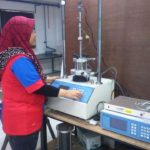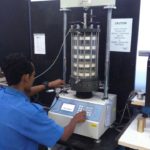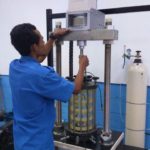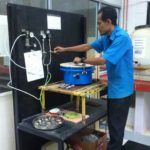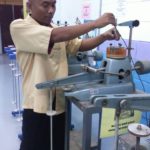- Constant Rate Strain
- Unsaturated Stress Path Triaxial
- Stress Path Cyclic Triaxial
- Pressure Extractor – SWCC
- Conventional Oedometer
 Geotechnics lab Facebook
Geotechnics lab Facebook
The Geotechnical Laboratories of Department of Geotechnical & Transportation (JGP) has two major laboratories:
- Soil mechanics laboratory- for testing ‘soft’ earth particulate materials, mainly soils and granular materials
- Rock mechanics laboratory- for testing rocks together with materials used in the support of rock excavations
The two laboratories are the key elements to JGP, since geotechnical engineering is a discipline highly dependent upon experimental investigations. Equipped with a series of modern experimental facilities, the laboratories are responsible for supporting research activities, providing training for both undergraduate and postgraduate students, and as a base for undertaking commercial testing and consultancy for industry.
Soil mechanics laboratory
1) VJ Tech Simple Shear System
2) GDS Unsaturated stress path triaxial testing system
GDS Unsaturated Triaxial Testing System (UNSAT) is an extension to traditional triaxial testing, in that soils from above the water table may be tested under conditions approaching the in-situ stress state and degree of saturation or partial saturation.
All GDS triaxial testing systems (as well as triaxial equipment from other manufacturers*) can be modified to allow for Unsaturated Triaxial Testing. GDS provide 4 methods to perform unsaturated testing.
- Method A: direct volume measurement using am air pressure/volume controller
- Method B: HKUST inner cell
- Method C: double walled cell
- Method D: on-sample strain transducers
However, our lab used method A for research purposes.
3) VJ Tech Automatic Consolidation System
4)VJ Tech Constant Rate strain
The VJ Tech Constant Rate of Strain Testing System utilises an Advanced TriSCAN Load Frame to apply vertical load to the sample contained in a CRS cell for CRS testing. The inbuilt data logging facilities of the Advanced TriSCAN are used to record the displacement and Pore Water Pressure. Back Pressure is provided by an Automatic Pressure Controller. The Clisp Studio csCRS software enables easy test setup and control with live tabular and graphical display of measured and calculated parameters and easy data export to standard packages. It conforms to ASTM D4186-06. Select the ‘Related Products’ tab for details of this System setup.
A PC-Controlled Advanced stress path triaxial testing system suitable for testing both sands and clays at two specimen sizes: 50 and 38 mm.
The system uses the proven GDSLAB software and the classic Bishop & Wesley – type 7kN/1700 kPa/38 mm/50 mm Stress Path triaxial cell with an internal submersible load cell. Based on the GDS advanced pressure controller, having three pressure controllers linked to a computer to the test cell as follows:
- One for axial stress and axial displacement control
- One for cell pressure control
- One for setting back pressure and measuring volume change
6) GDS cyclic triaxial testing system
The GDS cyclic triaxial testing system is hydraulically actuated with a large diameter triaxial cell suitable for testing samples with large particle sizes such as railway ballast. The system is capable of both monotonic (static) and dynamic triaxial tests as well as other advanced triaxial tests.
- 100kN Load range
- 0 to 10Hz Load frequency
- 200mm height 100mm diameter Sample size
- Volume change measurement
Rock mechanics laboratory
The laboratory has a long experience of rock sample testing, to ISRM standards, to measure all the principle strength parameters of rocks encountered in mining, tunneling, and quarrying. Samples are prepared as cubes, cylinders or to special geometries within the laboratory’s well equipped workshops, which includes a range of specialized coring rigs, diamond saws, and precision grinders. It has a wide range of compressive and tensile test machines from 20 tonne up to 500 tonne capacity, including:
- RDP Howden 100 Tonne Servo-controlled stiff press
- Large working area 1m2 with adjustable height up to 1.5 m
- Servo-controlled triaxial cell with volumetric measurement
- Multistage triaxial testing software
- Permeability testing under triaxial stress conditions
- Wide range of additional instrumentation
- High speed computer logging
Avery 500 tonne compression test machine
- Large working area 1m3
20 Tonne denison universal testing machines
- Tensile gripping jaws
Creep test facility
- Sample lengths up to 600 mm
- Sample diameters up to 100 mm
- Constant load up to 50 tonnes
- Test periods in excess of 20 days
Capability to perform full suite of ‘index’ tests on rock sample
- Cerchar
- Point Load testing
- NCB Cone indentor
- Shore Scleroscope
- Fracture toughness
A large radial core rig
- Capability to handle 4 tonne blocks
- extremely comprehensive instrumentation package capable of monitoring, logging, and controlling 16 influencing parameters.
- Bit wear evaluation
Creep test facility
- Sample Lengths up to 600 mm
- Sample Diameters up to 100 mm
- Constant load up to 50 tonnes
- Test periods in excess of 20 days
Capability to perform full suite of ‘index’ tests on rock sample
- Cerchar
- Point Load testing
- NCB Cone indentor
- Shore Scleroscope
- Fracture toughness
Rock sample preparation equipment
- 150mm Rock shear box with servo-controlled normal force
- TS 350FD Diamond Saw
- Large Masonary Saw
- Small Diamond Blade Saw
- Jones & Shipman 540 Surface Grinder for Rock Preparation
- Constant Head Permeability Lab Equipment
- Falling Head Permeability Lab Equipment
In addition, the following facilities are also available for teaching and research:
- Standard teaching triaxial apparatus
- Rowe-type consolidometers
- General data acquisition system
- Casagrande cup and fall cones
- Hydrometers
- Sieving device
- Permeability cells
- Oedometers
- Direct shear boxes

